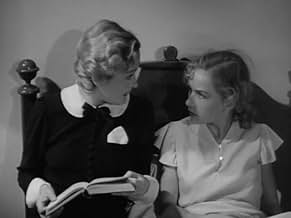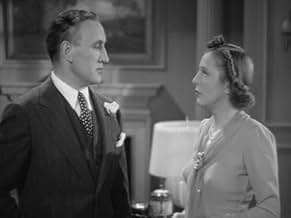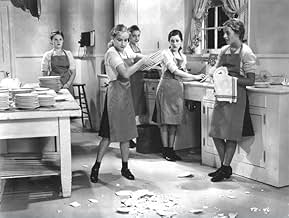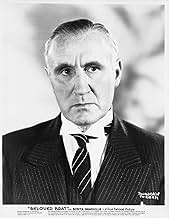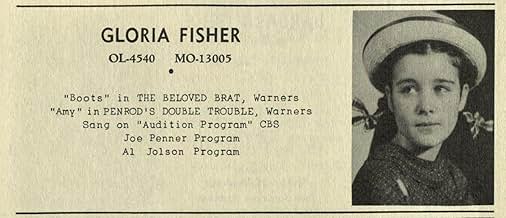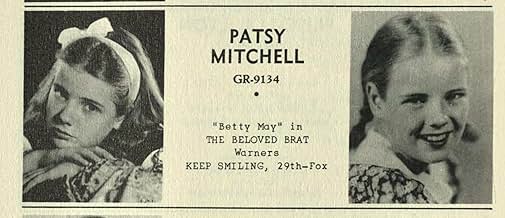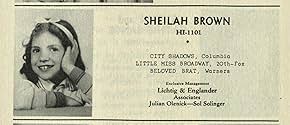AVALIAÇÃO DA IMDb
6,1/10
252
SUA AVALIAÇÃO
Adicionar um enredo no seu idiomaDrama about a problem child and her problem parents.Drama about a problem child and her problem parents.Drama about a problem child and her problem parents.
- Direção
- Roteiristas
- Artistas
Lucile Gleason
- Miss Brewster
- (as Lucille Gleason)
Matthew 'Stymie' Beard
- Pinkie White
- (as Stymie Beard)
Gloria Fisher
- Boots
- (as Gloria Fischer)
Jessie Arnold
- Nurse
- (não creditado)
Mary Avery
- Teacher
- (não creditado)
- Direção
- Roteiristas
- Elenco e equipe completos
- Produção, bilheteria e muito mais no IMDbPro
Avaliações em destaque
In the title role, Bonita Granville appears about as lovable as she'd been two years earlier in "These Three." A brat: Yes. Beloved? Not really. Not by the audience and not by her family.
She gets into mischief of an increasingly serious nature. Her self-involved wealthy parents are given the option of sending her to a school that seems to be a step above reform school.
The luminous Dolores Costello is employed there. Oh, who can forget her heartbreaking performance a few years later in "The Magnificent Ambersons"? She's very good here too.
All the acting is at least decent and often more than that.
From the beginning we see that Granville's character is the monster she is because no one -- not even her parents' servants -- likes or pays real attention to her. It's far from a great movie but it's also better than one would expect.
She gets into mischief of an increasingly serious nature. Her self-involved wealthy parents are given the option of sending her to a school that seems to be a step above reform school.
The luminous Dolores Costello is employed there. Oh, who can forget her heartbreaking performance a few years later in "The Magnificent Ambersons"? She's very good here too.
All the acting is at least decent and often more than that.
From the beginning we see that Granville's character is the monster she is because no one -- not even her parents' servants -- likes or pays real attention to her. It's far from a great movie but it's also better than one would expect.
Warner Bros. was known for gritty gangster pictures. Here, of all things, they've fashioned a gritty adolescent girl film, with a lot more boldness than I ever expected. More than a brat, Roberta's a little hellion, flinging food trays and emotional tizzies at the slightest provocation. We understand her problems come from an unloving wealthy household where she and the butler (Vogan) go ten-rounds without a referee.
But consider the darker side. She is, after all, partially responsible for the death of an innocent motorist, when she grabs the car wheel from butler Jenkins. The probation school reckoning for that strikes me as pretty mild. Nor, rather surprisingly, does the screenplay supply a moral reckoning. Also unexpected is the casualness with which Roberta crosses the colorline with Pinkie (Beard) and his Negro family. But then, she probably identifies more with them than with her distant mother and father. And I agree with another reviewer that there seems some innuendo from the handsome Williams toward the budding young woman.
All of this strikes me as unusual for a Production Code programmer. But then writer Negulesco directed some of the better studio products of the 40's and 50's, including the soulful Deep Valley (1947) and the surprisingly sensitive Take Care of My Little Girl (1952). Then too, Granville turns in an absolutely bravura performance that rivets attention throughout. Quite a risk for a young actress to make herself so unlikable for so much of the movie. Anyhow, the last third lapses into something much more conventional, as might be expected for what remains a commercial product. Nonetheless, there's enough of the unconventional in both filming and writing to make this little obscurity worth catching up with.
But consider the darker side. She is, after all, partially responsible for the death of an innocent motorist, when she grabs the car wheel from butler Jenkins. The probation school reckoning for that strikes me as pretty mild. Nor, rather surprisingly, does the screenplay supply a moral reckoning. Also unexpected is the casualness with which Roberta crosses the colorline with Pinkie (Beard) and his Negro family. But then, she probably identifies more with them than with her distant mother and father. And I agree with another reviewer that there seems some innuendo from the handsome Williams toward the budding young woman.
All of this strikes me as unusual for a Production Code programmer. But then writer Negulesco directed some of the better studio products of the 40's and 50's, including the soulful Deep Valley (1947) and the surprisingly sensitive Take Care of My Little Girl (1952). Then too, Granville turns in an absolutely bravura performance that rivets attention throughout. Quite a risk for a young actress to make herself so unlikable for so much of the movie. Anyhow, the last third lapses into something much more conventional, as might be expected for what remains a commercial product. Nonetheless, there's enough of the unconventional in both filming and writing to make this little obscurity worth catching up with.
It was fun, at first, to see the lead character acting like a complete brat. Refreshing to see black kids treated like normal kids, instead of racist stereotypes. Though I have to point out their mom doesn't get off so lightly. Nevertheless, Stymie Beard steals those early scenes. That kid had amazing comedic chops.
I didn't lose my mind when the Brat was responsible for vehicular manslaughter because, well, this is make-believe.
But she is such a relentless brat that it got tiresome. The only thing that kept me watching in the second half was Dolores Costello.
Wouldn't watch again.
I didn't lose my mind when the Brat was responsible for vehicular manslaughter because, well, this is make-believe.
But she is such a relentless brat that it got tiresome. The only thing that kept me watching in the second half was Dolores Costello.
Wouldn't watch again.
This film is unexpectedly relevant to what is happening today, 70 years later, as the Western world is being flooded with spoilt 'Frankenkinder' and China is being flooded with even more spoilt 'little emperors'. This is a very gritty tale written by the Romanian refugee Jean Negulesco, before he had begun to direct films. Negulesco did not write the script, and I suspect that was softened, and the ending made more sentimental than in his original story, in order to be more 'audience friendly'. Bonita Granville, a highly talented young actress of the time (best known for her four Nancy Drew mystery films, in which she excelled when she was somewhat older), plays the neglected daughter of a truly appalling spoilt rich couple. The mother is the worst sort, many of whom I have had the misfortune to know and who are more common than ever today; her interest is herself, and a child is at best an accessory and at worst a nuisance to be disposed of to servants and then to a boarding school. In her case, however, she did not even have the excuse of being a 'killer career woman', but was merely an idle and vain social snob. The father is only interested in making money, and is always out doing so. This leaves the normally charming Bonita, who has a great deal of fire to her character, to rebel and become in protest a hideously spoilt brat, and eventually even a delinquent entangled in a crime. This process is clearly shown, to a degree not at all normal in Hollywood films, where false sentimentality was the usual way to view children. Bonita Granville rises to the challenge extremely well, not hesitating to make herself as odious as necessary. There is a very wicked butler who torments the girl secretly, there is a very nice male secretary who tries to help her, and eventually an angelic school headmistress who wishes to save her. The film is really a very savage attack on the idle rich and their family victims. Negulesco, who had been a 'companion to rich older women' at Nice before coming to Hollywood, was clearly describing a woman of precisely the type he had known personally, with a rich absent husband and a victimized daughter such as he must have observed at first hand. It is a bitter tale, and honestly done except for the ending.
BONITA GRANVILLE specialized in playing brattish kid sister roles throughout most of the '30s (when she wasn't playing Nancy Drew), and this is one of her more insufferable roles as a rich brat given to tossing dinner trays out the window when in a huff.
She plays the neglected daughter of DONALD CRISP, only instead of pouting the way Shirley Temple would do under these "dire" circumstances, Bonita takes a feistier approach, talking back to the house servants and refusing to eat her spinach with much more vehemence than Shirley ever showed.
She befriends a black boy, only because he promises to teach her how to use his rifle. LEO GORCEY turns up as another unlikely companion for the poor little rich girl and from then on the film becomes pretty unwatchable as Bonita is taught a thing or two about changing her snobbish ways.
By the time the plot gets any thicker, Bonita has totally lost the patience of her parents as well as the viewer. Too bad Warner Bros. couldn't come up with better scripts for their child star instead of casting her in these insipid programmers that are enough to wear anyone's patience.
Any resemblance to the real world is purely coincidental.
Trivia note: The script was written by Jean Negulesco, who later made a much better director than screenwriter.
She plays the neglected daughter of DONALD CRISP, only instead of pouting the way Shirley Temple would do under these "dire" circumstances, Bonita takes a feistier approach, talking back to the house servants and refusing to eat her spinach with much more vehemence than Shirley ever showed.
She befriends a black boy, only because he promises to teach her how to use his rifle. LEO GORCEY turns up as another unlikely companion for the poor little rich girl and from then on the film becomes pretty unwatchable as Bonita is taught a thing or two about changing her snobbish ways.
By the time the plot gets any thicker, Bonita has totally lost the patience of her parents as well as the viewer. Too bad Warner Bros. couldn't come up with better scripts for their child star instead of casting her in these insipid programmers that are enough to wear anyone's patience.
Any resemblance to the real world is purely coincidental.
Trivia note: The script was written by Jean Negulesco, who later made a much better director than screenwriter.
Você sabia?
- CuriosidadesThe $50 Roberta receives from her father as a birthday present would equate to over $900 in 2019.
- Erros de gravaçãoIn two consecutive scenes between Donald Briggs and Dolores Costello, one interior and then exterior, first the shadow of the mike and then the mike and boom can be seen.
- ConexõesFeatured in Jack Wrather: A Legacy of Film and Friendship (2022)
Principais escolhas
Faça login para avaliar e ver a lista de recomendações personalizadas
Detalhes
- Data de lançamento
- País de origem
- Idiomas
- Também conhecido como
- Girls on Probation
- Locações de filme
- Empresas de produção
- Consulte mais créditos da empresa na IMDbPro
- Tempo de duração1 hora 2 minutos
- Cor
- Mixagem de som
- Proporção
- 1.37 : 1
Contribua para esta página
Sugerir uma alteração ou adicionar conteúdo ausente

Principal brecha
By what name was Dinheiro Demais (1938) officially released in Canada in English?
Responda
